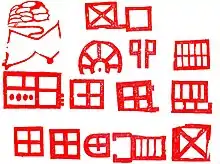| Gudahandi | |
|---|---|
| Native name Odia: ଗୁଡ଼ହାଣ୍ଡି | |
| Type | Hills |
| Location | Ampani, Koksara, Odisha |
| Coordinates | 19°37′5.023″N 82°32′54.389″E / 19.61806194°N 82.54844139°E |
| Elevation | 1,617 feet (493 m) |
| Governing body | Government of Odisha |
| Website | https://kalahandi.nic.in |
Gudahandi also known as 'Gudahandi Hills' and 'Gudahandi Caves' is a pre-historic site in Odisha, India. It is located in the Ampani sanctuary of Kalahandi district of Odisha.[1] It is close to the Nabarangpur district Border and about 17 km and 88 km away from Ampani and District Headquarters Bhawanipatna respectively.[2]
History
The word Gudahandi is derived from two Odia words, guda meaning raw sugar and handi meaning a clay pot. The appearance of the hills resembles sugar pots that used be used in Odisha. Pre-historic pictographs, drawings and inscriptions are crafted on the stone walls of the Gudahandi caves. These caves date back to 25,000 to 20000 CE.[3]
Paleolithic Paintings
The rock art shelter exhibits both monochrome and bi-chrome paintings of early historic period. It is the only reported rock art site of Kalahandi district.[4][5] The rock art panel preserves the specimen of paintings which include a stylized human figure in red, deer and a variety of geometric patterns of squares and rectangles either empty or in filled with straight and diagonal lines or with dots on the borders grid patterns, wheels with spokes, apsidal patterns, oval shapes with dots executed either in monochrome of red or in polychrome of red, blue and black.[6][7][8][9]
Gallery
References
- ↑ "Places of Interest | Kalahandi District: Odisha". Retrieved 2019-01-18.
- ↑ "History | Kalahandi District: Odisha". Retrieved 2019-01-18.
- ↑ Prusty, Subrat Kumar (2007). Odia Bhasa Sahitya Parichaya (1st ed.). Cuttack: A.K. Mishra publishers Pvt. Ltd, Satyabhama, Roxy lane, Badambadi, Cuttack-0,Odisha. pp. 7–8. ISBN 978-81-921347-1-0.
- ↑ "Rock Art Shelter of Gudahandi" (PDF). Indira Gandhi National Centre For The Arts.
- ↑ "Districts Gazetteers(Kalahandi)" (PDF). Government of Odisha.
- ↑ "Culture Department". odishaculture.gov.in. Retrieved 2019-01-18.
- ↑ Prusty, Subrat Kumar (2010). Bhasa O Jatiyata (1 ed.). Bidyadharpur, Jajpur: with financial assistance by Dept. of Culture, Govt. of Odisha. p. 22.
- ↑ Debi Prasanna Pattanayak; Subrat Kumar Prusty (2013). A Report on classical status of Odia Language (1st ed.). Bhubaneswar, Odisha: Department of Culture, Govt. Of Odisha. p. 90.
- ↑ Debi Prasanna Pattanayak; Subrat Kumar Prusty (2013). "Why not Odia?". Classical Odia. Vol. XXI (1st ed.). Maitri Vihar, Chandrasekharpur, Bhubaneswar, Odisha: KIIS Foundation, New Delhi. p. 33. ISBN 978-81-925616-3-9.

